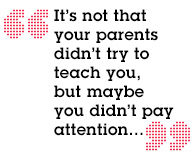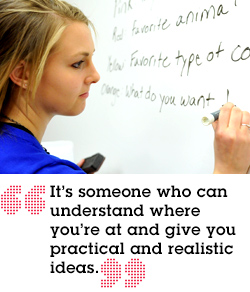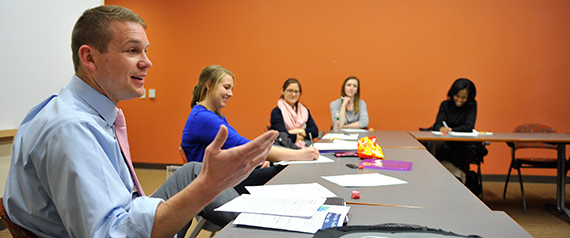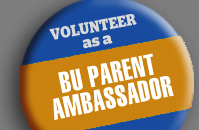Parent Magazine
Getting Ready for Life after BU
Students help each other prepare for life after college.
By Andrew Thurston
Photo of Farzad Irani (CGS’09; SAR’12, ’14) at Commencement 2012 by Matt Kalinowski for BU Photography
As graduation nears, many seniors are probably thinking, though perhaps not admitting out loud: If only I’d listened to my parents.
Soon they’ll have a job and a paycheck, utility bills, and, more than likely, a nine-to-five routine. What did Dad say about the secret family pasta recipe? How did Mom suggest washing light-colored clothes or stretching my money over a month?
BU prepares students to do anything they want—an international survey rated graduates seventeenth in the world in terms of employability—but sometimes it’s useful to get a refresher on life’s basics. Like cooking, time management, budgeting, and even getting a good night’s sleep.
 “It’s not that your parents didn’t try to teach you, but maybe you didn’t pay attention or maybe you just didn’t have any interest until you had to do it on your own,” says Mandy Patrick (SAR’11,’13), the founder of a program that helps undergraduates prepare for the world beyond college. Life after BU covers finances, résumé preparation, nutrition, stress management, and other topics billed to teach “the skills you need to live your life to its fullest.” The seven free workshops, offered on campus in the fall and spring semesters to all interested undergrads, are led by occupational therapy graduate students and they feature contributions from outside experts, such as bank managers and career advisors.
“It’s not that your parents didn’t try to teach you, but maybe you didn’t pay attention or maybe you just didn’t have any interest until you had to do it on your own,” says Mandy Patrick (SAR’11,’13), the founder of a program that helps undergraduates prepare for the world beyond college. Life after BU covers finances, résumé preparation, nutrition, stress management, and other topics billed to teach “the skills you need to live your life to its fullest.” The seven free workshops, offered on campus in the fall and spring semesters to all interested undergrads, are led by occupational therapy graduate students and they feature contributions from outside experts, such as bank managers and career advisors.
Worldly Wise
Lots of mashed potatoes. And boxed mac and cheese. It’s what got Dan Scanland (SAR’15) through his undergraduate years. But with age comes wisdom, so the tip sheet he handed out at the spring 2013 session on nutrition reminded students, “Instant ramen and a multivitamin is not a healthy meal.” Although Life after BU was founded by Patrick as part of her independent study, the intention is for a new set of Sargent College students to take the helm each year. Scanland was one of those chosen for 2013. In the session on eating well, he co-led discussions about a recipe for heart-healthy cookies, the secret to grocery shopping on a budget—buy the colors of the rainbow to get a balance of fruits and veggies—and on-campus resources for nutrition consultations.
 There are no lessons or lectures; the Sargent students and outside advisors come with prepared recommendations, but the sessions are informal, with peers trading pointers. “It’s someone who can understand where you’re at and give you practical and realistic ideas,” says Patrick. “I tried not to recommend things that I wouldn’t be able to do myself.” So, no exhortations to be tucked into bed by 10 p.m., but plenty of discussion about the best time of day for a half-hour nap or the quietest on-campus spots to catch forty winks (the comfy couches on the third floor of the Student Union, apparently).
There are no lessons or lectures; the Sargent students and outside advisors come with prepared recommendations, but the sessions are informal, with peers trading pointers. “It’s someone who can understand where you’re at and give you practical and realistic ideas,” says Patrick. “I tried not to recommend things that I wouldn’t be able to do myself.” So, no exhortations to be tucked into bed by 10 p.m., but plenty of discussion about the best time of day for a half-hour nap or the quietest on-campus spots to catch forty winks (the comfy couches on the third floor of the Student Union, apparently).
By getting new students to head the program each year, Patrick hopes the material retains its freshness and relevance. She adds that much of the course is also useful for life at BU and recommends freshmen, juniors, and sophomores consider attending. She’s even piloting a spin-off program for high school students preparing to transition to college.
Clinical Professor Karen Jacobs, a faculty advisor to the program, agrees that it’s more effective to have students, rather than the University, directing the program: “I think there’s going to be a lot more buy-in when there’s student involvement; students relate to each other.” And she sees another benefit, too. Students are just more aware than parents or professors of the challenges faced by the Class of 2013. Jacobs (SAR’79), who has been at BU for more than thirty years, the last eight as a faculty in residence, says modern students are confronting situations that their parents’ generation may not have: a new student loan environment, a sputtering economy, and Facebook, among others. “Time management has gotten more challenging. Many students are spending a lot of time on social media and that makes it problematic for getting some things done.”

Brian Troy of Citibank and Mandy Patrick (SAR'11,'13), in blue sweater, host a Life after BU session on money management. Photo by Kalman Zabarsky
But What about Parents?
That may leave some parents feeling left out. Patrick acknowledges that treading the line between encouraging and nagging can be “a tough balance.” So, in recognition that seniors aren’t the only ones preparing for life after BU, here’s some advice for parents:
Mandy Patrick, student: “Once you get to college, you start to listen to your parents a little more. My mom used to ask me, ‘Are you getting enough sleep?’ and I’d say, ‘Well, of course not!’ But she’d encourage me to try to, and it’s in the back of your mind. Parents can provide resources—give your kids a recipe or send them a gift card for the grocery store so they can buy some vegetables instead of hitting up the vending machine. Things like that can be really helpful. Just listen when they’re frustrated or trying to figure things out—sometimes just having someone listen is really helpful.”
Dan Scanland, student: “Parents could definitely try to teach their children how to prepare some simple meals, maybe a little bit of money management—have them open bank accounts, possibly even a credit card with a low limit so they can get used to using it and then paying it off. And definitely laundry. At least have them do their laundry.”
Karen Jacobs, professor: “Encourage your children to be as independent as possible in as many areas as possible.”
Finally, for any college seniors reading this, Lindsey Parker (LAW’13), a graduate of the program, has one last message. “It’s the big time now.” Life after BU is almost here, so embrace it and enjoy it. And don’t forget: wash light clothes separately from dark ones.
Students interested in Life after BU can visit their Facebook page to learn more about the program and sign up for events.
Know a soon-to-be College of Arts & Sciences freshman? Check out the for-credit First-Year Experience, introducing new CAS students to life at BU and in the city of Boston.







May 4, 2013
This initiative by BU is highly commendable. The concerns faced by parents are more or less the same, irrespective of nationality. As you have mentioned, children/ students tend to ignore the advice of parents. But the same thing coming from peers or seniors sounds like the best piece of advice that they could have got. So keep the good work going. I am certainly telling my daughter Kimaya, a Senior in the Computer Engineering program to enroll for this one.